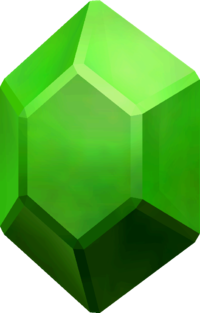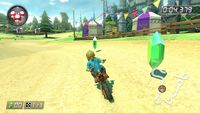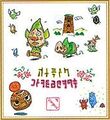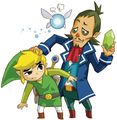| Don't like the ads? Then create an account! Users with accounts have more options than anonymous users. |
Rupee
It has been requested that additional images be uploaded for this article. Remove this only when the image(s) have been uploaded for this article.
| Rupee | |
|---|---|
 Artwork of a green Rupee from The Legend of Zelda: Skyward Sword | |
| First appearance | The Legend of Zelda (1986) |
| Latest appearance | Hyrule Warriors: Age of Calamity (2020) |
| Effect | Accumulates as spendable currency |
- This article is about the gem-based currency. For the final boss of Freshly-Picked Tingle's Rosy Rupeeland, see Rupee (boss).
- “Rupees are money, the things which make this world go round!”
- – Uncle Rupee, Freshly-Picked Tingle's Rosy Rupeeland
Rupees are small gems used as currency across the The Legend of Zelda franchise. They are typically shown with an elongated hexagonal cut, with different colors and occasionally sizes determining their worth. In some games, Link can store them in a wallet of varying sizes. Their name likely comes from both a real Asian currency and the gemstones known as rubies. Rupees appear in every title of the main The Legend of Zelda series except Zelda II: The Adventure of Link, which does not have any currency or purchasable items.
History[edit]
The Legend of Zelda series[edit]
The Legend of Zelda[edit]
In The Legend of Zelda, Rupees are spelled Rupies in the original in-game item list and called rubies in the NES manual.[1] However, the Tips & Tactics guide calls them rupees.[2] They appear in two forms in the game. Ones that flash between orange and blue are worth one, while ones that are a solid blue are worth five. They are usually dropped from defeated enemies, but can also be obtained by locating hidden caves with secret Molblins in them, which will bribe Link with varying amounts of Rupies. Link can carry up to 255 Rupies, the maximum value an unsigned 8-bit value can hold. He can spend them at a merchant's shop, the Money Making Game, or give them to old women for, advice, or in one case, Water of Life. Some old men with hidden homes will take Rupies from Link if he uncovers their caves, in order to pay for the door repair. Others found in dungeons may offer increased bomb capacity in exchange for Rupies. Additionally, shooting arrows costs a Rupy per arrow in this game.
In the Second Quest, some old men in dungeons will instead demand Link give them Rupies or one of his Container Hearts.
The Legend of Zelda: A Link to the Past[edit]
In The Legend of Zelda: A Link to the Past, Rupees' color values are changed. They come in green, blue, and red, which are worth one, five, and twenty, respectively. This matches the "green, blue/indigo/purple, red" strength color system the game uses for enemies and Link's tunics. Despite this, this system forms the basis of almost all later iterations. There are also ones worth 50, 100, and 300 that can only be found in chests, and are shown as a green Rupee with their respective number beside it. The carrying capacity for Rupees has been extended to 999.
Aside from buying, selling, and admittance to minigames, Link can throw large amounts of Rupees into the Pond of Happiness, which will cause his fortune to be told and, after certain intervals, Venus to appear to upgrade one of Link's item supplies. Rupees can also be stolen by enemies like thieves, Pikits, and Pick. Aside from defeated enemies, Rupees can be found inside chests, grass, rocks, and pots, as well as occasionally out in the open or underground in shovelable holes. This continues in later games.
In the Game Boy Advance version, Rupees can additionally be found by repeatedly striking shining rocks known as Rupee Rocks.
The Legend of Zelda: Link's Awakening[edit]
In The Legend of Zelda: Link's Awakening, all Rupees on the overworld are worth a single Rupee, due to the monochrome graphics of the Game Boy. However, larger values can be found in chests. A few winged ones can also be found in some places, such as Rapids Ride, and require a jump with Roc's Feather to reach. Like in The Legend of Zelda: A Link to the Past, Link can carry up to 999 Rupees.
In The Legend of Zelda: Link's Awakening DX, Rupees dropped by enemies, found in chests, and flying with wings are all blue. However, the ones in the Trendy Game are orange and worth 30 Rupees. In the Color Dungeon, a secret room full of green Rupees can be found, with each being worth five Rupees.
The Legend of Zelda: Ocarina of Time[edit]
In The Legend of Zelda: Ocarina of Time, Rupees have colors based on their appearance in The Legend of Zelda: A Link to the Past. Additionally, they appear in purple (worth 50) and gold (worth 100, called Huge Rupees), both of which are larger than the normal three types. Additionally, there is a medium-sized white type worth five that is used in certain dungeon puzzles, where all in the room must be collected for a door to open. The Rupees that appear on the field in this game have a somewhat atypical design, lacking the flat front they usually have. However, when found in chests or as rewards, they use a different model with more polygons, and as such have the flat front and a somewhat rounder shape, as well as being shinier. There is also some minor color differences between the on-field and reward ones, with the purple and Huge ones appearing as pinkish and flat orange when on the field. Purple Rupees can appear on the field by defeating an enemy with the Light Arrows, and Huge Rupees by defeating Skull Kid. White Rupees, due to their role, are never found in chests.
The game introduces the concept of variably-sized wallets, allowing Link to carry more Rupees. At first, he can only carry up to 99 Rupees, but this can be increased to 200 and 500 with the first and second Wallet upgrades respectively.
In The Legend of Zelda: Ocarina of Time 3D, field and reward Rupees now share a model, and as such are always shown with the front face.
The Legend of Zelda: Majora's Mask[edit]
In The Legend of Zelda: Majora's Mask, Rupees have the same role, model, and colors as in The Legend of Zelda: Ocarina of Time, with the exception that white Rupees are replaced with nearly-identical silver Rupees, a rare type of Rupee worth 100. The Rupee capacity, along with the wallet upgrades, have also been retained from The Legend of Zelda: Ocarina of Time.
Due to Skull Kid's different role, the enemy to give a Huge Rupee upon defeat in this game is the Takkuri, which itself steals Rupees and items. There is also a bank where Link can deposit his Rupees; the banker stamps Link's balance onto him, and as such he keeps the balance even after the three days reset from playing the Song of Time. Link can store up to 5,499 Rupees in the bank. The enemies on the field are more likely to drop a red Rupee if Link has fewer than 20 Rupees.
The Legend of Zelda: Oracle of Seasons/Ages[edit]
In The Legend of Zelda: Oracle of Seasons and The Legend of Zelda: Oracle of Ages, Rupees can be found in various colors, worth different amounts. Sometimes, the same color may be used for different amounts, depending on the context. They come in three sizes, with the smallest coming in green, blue, and red, worth one, five, and ten, respectively; of these, only the first is ever dropped from enemies, breakable objects, or digging holes, with the rest only appearing from chests.
Medium-sized Rupees come in orange and dark blue. Orange ones are usually worth five, though dark blue ones can be worth 20 or 30; of these, only the former color is dropped from random locations, with the latter only appearing in chests and as minigame prizes. When the orange ones appear in these situations, they are worth 50. In the former game, secret rooms in a few dungeons have floors covered in Rupees of this size, with them either being all green or all yellow. Each of these randomly may give Link one, five, ten, or 20 Rupees.
Rarely, giant-sized dark blue and orange Rupees appear, worth 100 and 200, respectively, with the former rarely showing up while digging and the latter only being a chest or Gasha Nut prize. Both games revert to the 999 Rupee limit in The Legend of Zelda: Link's Awakening, which the gameplay is largely based on. In Subrosia, Rupees are considered unfit for currency, and instead Ore Chunks are used.
The Legend of Zelda: Four Swords[edit]
Due to the different gameplay structure of The Legend of Zelda: Four Swords, Rupees are no longer used for buying things. Instead, they are gathered in large amounts and given to the Great Fairies at the end of each level for a special key to Vaati's Palace. Depending on the total, the Links will receive a Silver Key, a Golden Key, or a Hero's Key. She will also give the Links a title based on the amount, and the Link to collect the most Rupees will receive a Medal of Courage. Rupees in this game come in three colors and two sizes. The small Rupees are priced the same as the ones in A Link to the Past, while big green, blue, and red ones are worth 50, 100, and 200, respectively. There is also a black type called a Rupoor that causes a Link to lose his Rupees instead. Rupees can be found from defeated enemies or in various objects, and occasionally simply spawn onto the field in large amounts. When all the Links are at full health, they have a bonus called Rupee Fever, which doubles the worth of each Rupee collected, though this condition is lost if any lose health. Some new enemies steal Rupees, being the Pseudo Rupee, which disguises itself as a Rupee only to trap and drain a Link of his Rupees, and the Rupee Wraiths, which circle a Link while draining his Rupees.
The Legend of Zelda: The Wind Waker[edit]
In The Legend of Zelda: The Wind Waker, green, blue, red, and purple Rupees reappear, again worth one, five, twenty, and fifty, respectively. The game introduces a yellow type worth 10. Orange Rupees are worth 100, and silver Rupees worth 200. All Rupees appear roughly the same size. They keep their purpose of being used for buying, selling, and playing minigames. At first, Link can only carry up to 200 Rupees, but this can be increased to 1,000 and 5,000 with the first and second wallet upgrades respectively. Aside from their typical sources, Rupees can occasionally be fished up with the Salvage Arm. There are enemies named Rats that steal Rupees.
In The Legend of Zelda: The Wind Waker HD, Rupees are now used as the health for the Magic Armor, like in The Legend of Zelda: Twilight Princess, instead of the Magic Meter. The initial carrying capacity has also been increased to 500.
The Legend of Zelda: The Minish Cap[edit]
In The Legend of Zelda: The Minish Cap, Rupees have the same graphics and values as in The Legend of Zelda: Four Swords. Wallet upgrades return from the 3D titles. At first, Link can only carry up to 100 Rupees, but the first, second, and third upgrades increase this limit to 300, 500, and 999, respectively.
Certain Kinstone fusions grant large sums of Rupees, and are usually marked with a picture of a blue Rupee in the fuser's thought bubble. Keatons in this game cause Link to lose Rupees, though unlike with thieves, the Rupees will immediately vanish upon hitting the ground.
The Legend of Zelda: Twilight Princess[edit]
In The Legend of Zelda: Twilight Princess, Rupees have the same color system as in The Legend of Zelda: The Wind Waker. The initial carrying capacity is 300, but the first and second wallet upgrades can increase it to 600 and 1,000 respectively. Finding small amounts of Rupees, usually in chests, now has its own musical sting. The Magic Armor in this game uses Rupees as health. If Link has no Rupees and wears it, it weighs him down like the Iron Boots, but lacks the magnetic power. Wolf Link can dig up Rupees from certain shiny spots. In certain areas, such as Trill's shop and Gor Ebizo's donation box, Link has the option to deposit as many Rupees as he likes, and can get various reactions if the amount he gives are below or above sufficient for the intended purpose. If Link's wallet is too full for a chest-based Rupee to fit, he will put it back. This is changed in The Legend of Zelda: Twilight Princess HD so that the player is given a choice whether to keep it or put it back, likely due to the unintended annoyance of a difficult-to-reach chest remaining on the dungeon map.
The Legend of Zelda: Phantom Hourglass[edit]
In The Legend of Zelda: Phantom Hourglass, green, blue, and red Rupees reappear with their typical values. There are also large green, red, and gold Rupees worth 100, 200, and 300, respectively. Rupoors reappear with their former role. Like in The Wind Waker, Rupees can be salvaged up. A creature known as Squiddy keeps giving a long chain of Rupees as long as it is kept out of the water with the cannon.
The Legend of Zelda: Spirit Tracks[edit]
In The Legend of Zelda: Spirit Tracks, Rupees have the same values as in Phantom Hourglass, though Rupoors do not reappear. Squiddies are now unique to the Ocean Realm.
The Legend of Zelda: Skyward Sword[edit]
In The Legend of Zelda: Skyward Sword, Rupees appear in the typical green, blue, and red. Silver and gold Rupees reappear, worth 100 and 300, respectively, and are the same size as the normal three. Rupoors also reappear. The Mogma Tubert operates a Minesweeper-esque minigame called Thrill Digger, where Link can obtain various sums of Rupees while avoiding Rupoors and bombs. The cave with the minigame also features Rupee Ore on the walls, which give Rupees of their color when shot. The Rupee Medal and Cursed Medal both cause more Rupees to appear if equipped, though the latter comes with the drawback of Link not being able to use the items in his Adventure Pouch.
The Legend of Zelda: A Link Between Worlds[edit]
In The Legend of Zelda: A Link Between Worlds, all the colors from Majora's Mask reappear, with gold ones being worth 300 like in Phantom Hourglass. They also once again come in varying sizes. Rupee Rocks reappear, alongside the new Rupee Boulders, which release a large amount of Rupees upon destruction. Ravio has a Rupee obsession, saying that Rupees are more important than life itself if Link investigates his large wallet.
The Legend of Zelda: Tri Force Heroes[edit]
In The Legend of Zelda: Tri Force Heroes, Rupees have the same appearance and color system as in A Link Between Worlds. Squiddies reappear, now land-based, and if kept bouncing for a sufficiently long time, will explode into a cloud of Rupees. When a boss or mid-boss is defeated, they will explode into a larger cloud of Rupees. Starting with Arrghus, purple Rupees can be included in these, and later, the costlier ones start appearing as well. Wearing the Rupee Regalia increases the odds of rare Rupees appearing, and causes dropped Rupees to appear in pairs. This also occurs if all three Links wear a Tri Suit. In the Den of Flames, it is shown that if a blue Rupee is burned for too long, it becomes a green Rupee.
The Legend of Zelda: Breath of the Wild[edit]
In The Legend of Zelda: Breath of the Wild, Rupees have the same color system as in A Link Between Worlds, but without the size differentiation. Monsters typically do not drop them, aside from Treasure Octoroks and Yiga Tribe members. They are usually found under rocks or in crates, pots, barrels, and chests.
CD-i games[edit]
Link: The Faces of Evil / Zelda: The Wand of Gamelon[edit]
In both Link: The Faces of Evil and Zelda: The Wand of Gamelon, Rubies are used to buy lamp oil, ropes, and bombs at the respective merchant's shop. Aside from this, certain items cost a certain amount of Rubies per use, likely inspired by the arrows in the first game. They come in red, green, and blue, worth one, five, and ten, respectively. Link and Zelda can hold up to 999 Rupees.
Zelda's Adventure[edit]
In Zelda's Adventure, Rupees are referred to as such in the manual, but called Rubies in-game, which may be related to the lengthy testing period of the game, as the manual would have been written long after the lines were recorded. They come in blue and yellow, worth five and ten, respectively. Rupees are usually obtained by defeated enemies, though certain items and events can earn Zelda a large amount of Rupees. Zelda can carry up to 999 Rupees.
Rupees are used to purchase items, though they have to be selected in Zelda's inventory before they can be used. They are also used as fuel for Zelda's wand, allowing her to cast various spells. Without Rupees, she can only use it as a blunt weapon. Most spells are only worth between one and three Rupees, though more powerful ones that are used for damaging bosses may be over ten times these amounts.
Freshly-Picked Tingle's Rosy Rupeeland[edit]
In Freshly-Picked Tingle's Rosy Rupeeland, some Rupee colors do not have set amounts, but have ranges associated with them. However, green, blue, and yellow Rupees are always worth one, five, and ten, respectively. Red, purple, and orange are close to their The Wind Waker values, but are not consistently precise. In the game, Tingle is told by a Rupee-headed man called Uncle Rupee to collect and throw as many Rupees as possible into the Western Pool to gain access to "Rupeeland." However, Uncle Rupee is actually using Tingle to grow stronger. Additionally, Rupees act as Tingle's health. In some cases, Tingle may ask people for different amounts of Rupees, though if he asks for too many, the person he asks will give him nothing due to his greed. Some people will refuse to interact with Tingle unless he gives them Rupees first. In the game's finale, Uncle Rupee transforms into a giant Rupee himself, simply referred to as Rupee, and acts as the final boss.
Satellaview games[edit]
BS Zelda: Kodai no Sekiban[edit]
In BS Zelda: Kodai no Sekiban, a maximum of 99,999 Rupees can be carried, a lot more than in most The Legend of Zelda games, although strict time limits during the original broadcasts made it a nearly impossible feat.
Mario Kart 8[edit]

In the DLC of Mario Kart 8 and the base game of Mario Kart 8 Deluxe, green rupees are found in Hyrule Circuit, replacing the coins from most other courses. Rupees are only different from coins aesthetically. Rupees allow vehicles to move slightly faster, and players can carry up to ten rupees at a time. If a racer goes out-of-bounds, Lakitu takes a few rupees from them.
Hyrule Warriors series[edit]
Hyrule Warriors[edit]
In Hyrule Warriors, Rupees are found in massive amounts in the various stages in green, blue, and red, and are used to craft upgrades, weapons, and potions. Finding a Rupee Fairy in one of the DLC Adventure Mode maps can cause silver and gold ones to appear as well. Scanning an amiibo may give a dud "prize" of a single Rupee. In the Twilight Princess Pack, it is also available as a Parasol called the 8-Bit Rupee.
Hyrule Warriors: Age of Calamity[edit]
In Hyrule Warriors: Age of Calamity, Rupees appear as items throughout the various scenarios, and return as currency for goods and services. Rupees can also be obtained from selling items.
 This section is a stub. You can help Triforce Wiki by expanding it.
This section is a stub. You can help Triforce Wiki by expanding it.
Profiles[edit]
The Legend of Zelda[edit]
- Wii U Virtual Console manual bio: "Rupees are the monetary unit in this world. You can use them to shop."
Gallery[edit]
Artwork[edit]
-
The Legend of Zelda
-
An ofuda featuring Uncle Rupee, from the printable on the Japanese site for Freshly-Picked Tingle's Rosy Rupeeland
-
2007 nengajō for Nintendo Dream from Vanpool, based on Freshly-Picked Tingle's Rosy Rupeeland
Sprites[edit]
-
The Legend of Zelda
-
The Legend of Zelda: A Link to the Past
-
The Legend of Zelda: A Link to the Past
-
Link: The Faces of Evil / Zelda: The Wand of Gamelon
-
Link: The Faces of Evil / Zelda: The Wand of Gamelon
-
Link: The Faces of Evil / Zelda: The Wand of Gamelon
-
Zelda's Adventure
-
Zelda's Adventure
-
The Legend of Zelda: The Minish Cap
-
The Legend of Zelda: The Minish Cap
-
The Legend of Zelda: The Minish Cap
-
The Legend of Zelda: The Minish Cap
-
The Legend of Zelda: The Minish Cap
Scans[edit]
Names in other languages[edit]
| Language | Name | Meaning |
|---|---|---|
| Japanese | ルピー Rupī |
Rupy/Rupee |
| Chinese (Simplified) | 卢比 Lúbǐ |
Rupee |
| Chinese (Traditional) | 盧比 Lúbǐ |
Rupee |
References[edit]
- Gemstones
- The Legend of Zelda items
- The Legend of Zelda: A Link to the Past items
- The Legend of Zelda: Link's Awakening items
- Link: The Faces of Evil items
- Zelda: The Wand of Gamelon items
- Zelda's Adventure items
- The Legend of Zelda: Ocarina of Time items
- The Legend of Zelda: Majora's Mask items
- The Legend of Zelda: Oracle of Seasons items
- The Legend of Zelda: Oracle of Ages items
- The Legend of Zelda: Four Swords items
- The Legend of Zelda: The Wind Waker items
- The Legend of Zelda: The Minish Cap items
- Freshly-Picked Tingle's Rosy Rupeeland items
- The Legend of Zelda: Twilight Princess items
- The Legend of Zelda: Phantom Hourglass items
- The Legend of Zelda: Spirit Tracks items
- The Legend of Zelda: Skyward Sword items
- Nintendo Land items
- The Legend of Zelda: A Link Between Worlds items
- Hyrule Warriors items
- Hyrule Warriors weapons
- Mario Kart 8
- The Legend of Zelda: Tri Force Heroes items
- The Legend of Zelda: Breath of the Wild items
- Cadence of Hyrule: Crypt of the NecroDancer featuring The Legend of Zelda
- Hyrule Warriors: Age of Calamity items







